Choosing the right ecommerce platform for your business is tough, especially if your options narrow down to such behemoths as BigCommerce vs Magento.
The two platforms take a large market share and are a popular choice among merchants. Both Magento and BigCommerce will get you on your feet in ecommerce as well as provide extensive out-of-the-box capabilities to support interactive commerce experience. But there’s more under the hood that makes retailers choose one platform over another.
Elogic is a certified BigCommerce partner and a Bronze Adobe Solution partner, so we know the ins and outs of both platforms.
This article will walk you through the differences between the two platforms in terms of their ease of use, design flexibility, security, and price among others, so you can find the right warrior to bet your gold coin on.
What’s the Difference Between BigCommerce and Magento?
If you don’t like long-reads, here are some quick facts to help you compare BigCommerce vs Magento 2 at a glance.
| Adobe Commerce (Magento 2) | BigCommerce | |
| Release date | 2008 | 2009 |
| Ease of use | Complex | Easy |
| Hosting | On-premises, third-party, cloud-based | Cloud-based |
| Extensions | 5,000+ | 1,000+ |
| Features | Feature-rich | Feature-rich |
| Ease of Integration | Flexible | Flexible |
| Theme selection | 17 official themes, dozens on unofficial marketplaces, and custom-made designs developed by agencies | 7 free and 50+ paid themes |
| Payment Gateways | 3 payment gateways integrated out-of-the-box + any gateway can be added via API | 40 payment gateways supported |
| Security | PCI compliant.Supports advanced security and updates | PCI compliant.Free and paid BigCommerce SSL certificates available |
| Multilingual capabilities | Built-in multilingual support. | Multilingual capabilities are supported only if third-party apps are added. |
| Support | Fora, official Magento documentation, tickets + official 24/7 customer support for Adobe Commerce. | 24/7 support via chat, email, and phone. |
| Available Devices | Windows, Android, iPhone/iPad, Mac, Web-based | Windows, Android, iPhone/iPad, Mac, Web-based |
| Ideal Ecommerce Size | Medium-sized and large businesses | Small and medium-sized businesses |
| Pricing | Open Source – free.Commerce – $22.000/year.Commerce Cloud – $44,000/year. | Standard – $29.95/month.Plus – $79.95/month.Pro – $199.95/month.Enterprise – quote-based. |
BigCommerce overview
BigCommerce is a SaaS platform for fast-growth businesses. Traditionally focused on SMBs with <$50 million in gross revenue, BigCommerce market share is 0.4% with 49,907 live ecommerce websites worldwide. BigCommerce technology stack relies on a PHP-based platform, MySQL database, and a number of plugins. The platform works on a subscription model, with the monthly fees starting at $29.95.
| BigCommerce pros | BigCommerce cons |
| Affordable | Extra BigCommerce add-ons and extensions can cause cost overheads for small business owners |
| Easy to learn and use | Less customizable |
| Feature-rich | A small selection of free themes |
Magento overview
Named a leader according to the 2022 Gartner Magic Quadrant for Digital Commerce, Magento (now known as Adobe Commerce) is an open-source ecommerce platform for midsize and enterprise-level B2C and B2B companies with >$50 billion in gross revenue.
The vendor offers a free (Magento Open Source) and a paid (Adobe Commerce) solutions. It’s always been one of the most customizable solutions on the market, and Magento’s acquisition by Adobe in 2018 pushed the platform integration capabilities even further.
| Magento 2 pros | Magento 2 cons |
| Fully customizable | Complex to develop |
| Feature-rich | Time-consuming to customize |
| Scalable | Expensive |
The key difference between Magento 2 vs BigCommerce is the nature of the platforms.
BigCommerce is a hosted all-in-one package solution that doesn’t require any tech skills to start a store. It basically works as an ecommerce website builder where you pay the vendor for using their server resources, pre-built themes & modules, and all the tech stack. You can build a BigCommerce website alone, so the solution works perfectly for small business owners.
Magento is an open-source platform, which means that you own the technology behind your website. Having access to the core product code, you can customize it into a one-of-a-kind store and integrate any third-party systems via APIs. This is the option for tech-savvy merchants who undertake large projects with development teams (or at least have enough budget to hire a Magento developer).
Before we continue, why not see how Magento compares to Shopify and WooCommerce?
Magento vs BigCommerce Comparison
Now that you’ve made it to a detailed Magento BigCommerce comparison guide, find a list of factors to consider before building the store on each of the platforms. Let’s dig in!
Pricing
Value for money is crucial if you intend to get the best ecommerce solution.
BigCommerce pricing has four tiers starting from $29.95/month. The tricky part about them is that the plan is assigned to you based on your annual income. Once you scale and reach certain annual sales thresholds (including tax), you’re automatically moved to a more advanced pricing plan.
You can still take advantage of a 15-day trial period. But watch out for some associated costs while building a BigCommerce store, such as the domain & SSL certificates, paid themes and add-ons, and partner support fees.
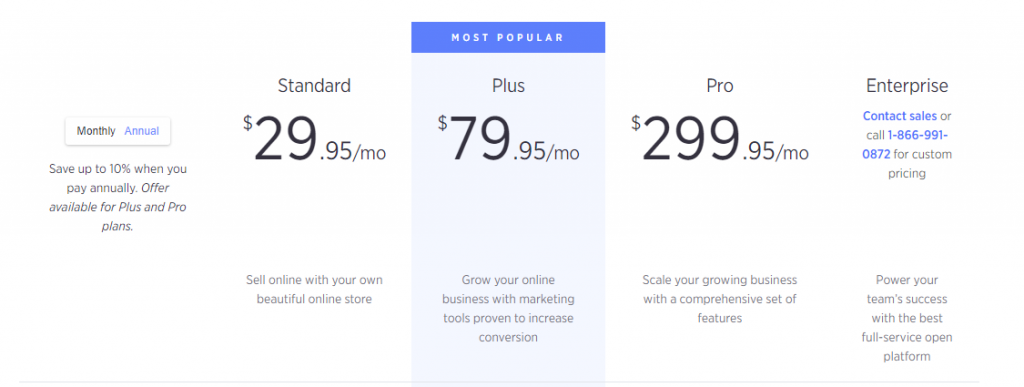
Adobe Commerce follows a different pricing model. While Magento Open Source comes free of charge (download the core code from the Magento Open Source GitHub repository), the vendor charges license fees for the advanced editions. Adobe Commerce edition will cost you $22,000+/year, and Adobe Commerce Cloud — $40,000+/year. Mind that the latter two editions unlock more features, so you might actually spend less on Magento extensions and modules than you would on BigCommerce.
For more details, take a look at our full-fledged guides on BigCommerce pricing and Magento pricing.
Features
Both Magento and BigCommerce come with advanced out-of-box features that can be further extended with third-party modules and systems.
Read more: 14 Must-Have eCommerce Website Features in 2023
Because customization is difficult with BigCommerce, the vendor provides a robust set of native features (especially the sales & marketing ones) to quickly set up and effectively run your ecommerce website.
General BigCommerce platform features list:
- Website builder
- Payment and inventory management
- SEO and analytics optimization
- Product catalog
- Marketing tools
- Social Media Marketing
- Products and merchandising
- Product options and bundling
- Mobile-optimized store
- Multi-currency support
- Configurable fields
- In-store search
- Google AMP on product and category pages
- Social and cross-channel commerce integration (Amazon, eBay, social media, etc)
Adobe Commerce is no slacker either. On top of customization possibilities, Magento boasts a wide variety of out-of-the-box features, including
- Marketing, promotions, and conversion tool
- Site management
- Search Engine Optimization
- Catalog management
- Product browsing
- Catalog browsing
- Checkout, payment, and shipping
- Order management
- Customer accounts
- Customer service
- International support
- Analytics and reporting
- Mobile commerce
The abovementioned features are basic. Check out the full Adobe Commerce features list here.
Hosting
Being a SaaS platform, BigCommerce comes as a hosted solution that runs on the Google Cloud platform. You shouldn’t worry about finding the right BigCommerce hosting provider or about downtime as BigCommerce has an average uptime of more than 99.99%. With BigCommerce cloud hosting, you get faster page load times and spend less time maintaining your website.
Adobe Commerce (Magento) can be hosted on-site, in the cloud, or through a third party. With Magento Commerce Cloud, your store is fully hosted in AWS or Microsoft Azure, while in Magento Open Source you need to purchase your domain and hosting alone.
Theme selection
It takes about 50 milliseconds for visitors to form an opinion on your website. Let’s see whether Magento and BigCommerce have SEO-friendly, mobile-responsive, sleek designs to meet this 0.05 seconds expectation.
BigCommerce provides 12 free and 50+ paid themes at a price range from $145 to $300. All of these themes are responsive and easy to customize. You can also take advantage of the BigCommerce design services of a professional ecommerce development agency and tailor your theme specifically to your customers’ journey.
Read more: 10 Best BigCommerce Themes to Improve UX and Get More Happy Customers

After Magento’s rebranding into Adobe Commerce, the vendor is slowly eliminating pre-built themes from its marketplace. Currently, you’ll find five templates masters on the official marketplace that might serve as a basis for your own UI/UX design.
But there are two more ways to find a theme for your Magento store:
- Multiple templates are available on community-based websites such as ThemeForest and Template Monster.
- Many development agencies offer Adobe Commerce web design services, so you can create and apply a custom theme to give your website a unique look and feel. Just like Elogic Swiss client, Glassmania, did!

SEO
Unless your company doesn’t show up on the first page of SERP, consider yourself out of the ecommerce game. Fortunately, you have the native SEO tools in both BigCommerce and Magento to rank high on Google.
BigCommerce has all the necessary tools to make your website Google-friendly. You can edit page titles and meta descriptions, add alt text to images, and customize URLs. You can even create a BigCommerce robots.txt file and a Google sitemap to help crawlers index your webpages faster. With BigCommerce, store owners also get access to a program called SocialShop that allows posting promotions directly on Facebook, Pinterest, and Twitter.
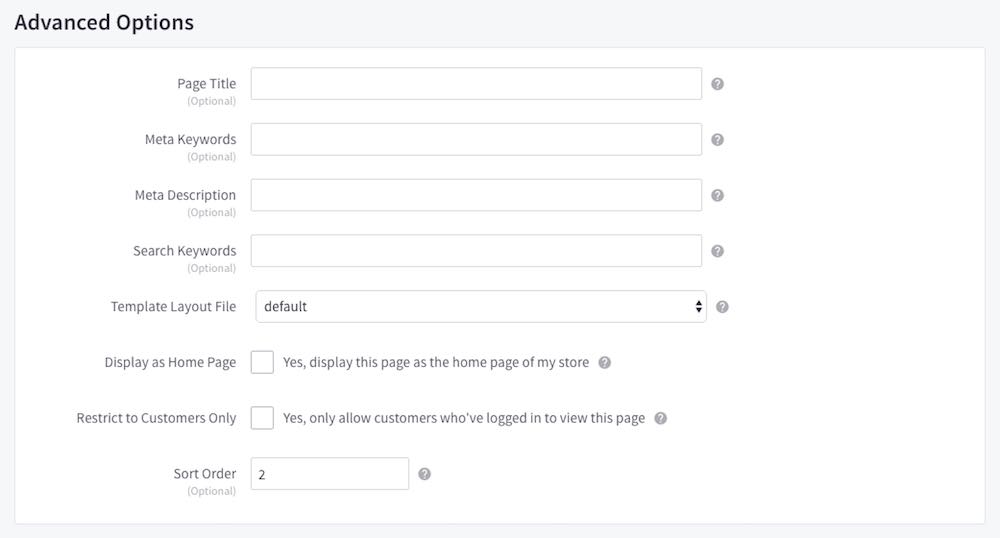
Adobe Commerce (Magento) ecommerce platform is also praised for its SEO-friendliness, especially when it comes to technical SEO. Besides metadata, robots.txt file, and many other Magento SEO settings also present in BigCommerce, a merchant can access Magento source code and optimize it for search engines. Additional features of Auto-Generation and Schema.org also help to set templates for product metadata and boost the search engine rankings of your ecommerce store faster.
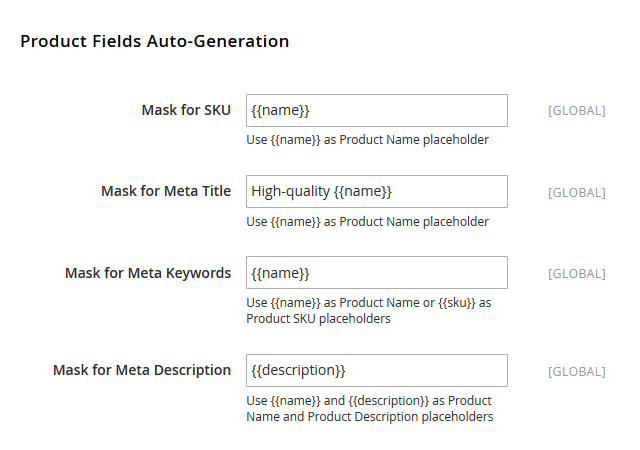
Extensions and apps
If you find native functionality insufficient for your needs, you can always extend it with extra add-ons and apps.
BigCommerce App Marketplace offers about 1,000+ official extensions — both paid and free. They can be downloaded directly from your store admin panel, so you’ll face no installation hassle.
Magento Marketplace presents a merchant with 5,000 extensions in different categories — from cart customization to cross-border fulfillment. The installation process is a bit more complicated, though, and you’ll need to check for compatibility issues before choosing an extension.
Insider tip: Mind that expanding website functionality can cost a pretty penny in the long run. Initially, your budget won’t be stressed after one or two installed plugins. But as your store grows, you might need to purchase, install, and upgrade more and more extensions. So we always recommend our enterprise clients prioritize the robust native features of an ecommerce platform over the number of extensions.
Payment Options
A payment gateway is a service that enables ecommerce websites to accept debit or credit cards within the existing software. Magento and BigCommerce provide a fine selection of payment gateways, giving your customers the possibility to opt for the most relevant one.
BigCommerce supports over 40 payment options, including PayPal, Stripe, Amazon Pay, Authorize.net, and more. With BigCommerce payment gateways, you don’t have any transaction fees on all price plans. However, BigCommerce doesn’t support such payments as Swedbank, SEB, etc that are commonly used in local markets.
Adobe Commerce supports three payment methods out of the box: PayPal, Braintree, and Authorize.net. Other Magento payment gateways can be integrated via API, including Square, Stripe, Amazon Payments, etc. The API-led architecture of Magento resolves the issue BigCommerce can’t: local payment gateways to meet the customer preferences in a particular market. Just take a look at how smoothly custom payment integration went in the case of Carbon38!
Implement even the most arduous custom BigCommerce payment gateway integration with Elogic
Hire a BigCommerce developer nowSecurity
The biggest disadvantage of ecommerce is security risks. So your chosen platform should be PCI compliant, to say the least. This way, you can keep your customers’ sensitive data secure especially in the face of cyberattacks occurring every day.
BigCommerce security is level 1 certified PCI and ISO/IEC 27001 certified compliant making sure that financial transactions are encrypted. BigCommerce also provides free and paid SSL certificates in all of its pricing plans. The stores built on BigCommerce are protected by multiple layers of security to prevent unauthorized access.
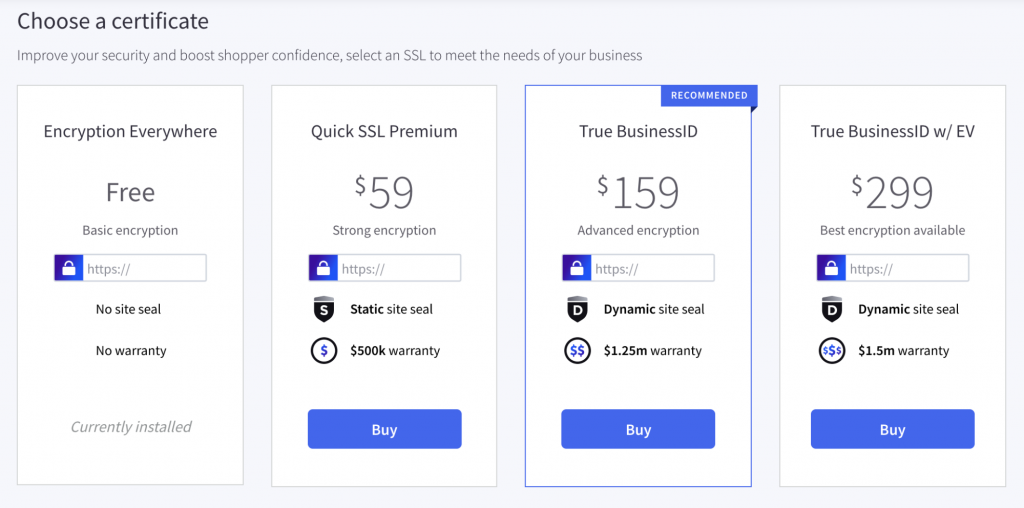
Is Magento secure? Adobe Commerce offers one of the most powerful security solutions for online stores. It is PCI compliant and supports such advanced technologies as Zend Framework, Composer, PHP 7, Symfony, and the integration of SSL certificates. A merchant can integrate Magento 2 security extensions to further protect their store from cyberattacks, and the platform frequently releases security patches to protect the system from malware and cyberattacks.
Read more: Magento Security Tips: Best Practices to Protect Your Site | Elogic
Scalability & performance
A truly future-proof ecommerce solution should address your scalability needs without sacrificing website performance. Let’s compare BigCommerce and Magento in terms of scalability and performance.
BigCommerce touts itself as a highly scalable platform even though it may not necessarily be the case. Multinational retailers like Toyota or Clarks do have their stores powered by BigCommerce; however, it’s only the enterprise plan that supports big retailers ambitions. In particular, BigCommerce Enterprise can handle 400+ API calls per second and supports up to 30,000 SKUs in a catalog. However, you won’t be able to optimize code, which is often essential for scalability; so you’ll have to lift a few bulky BigCommerce add-ons and opt for a lighter theme when the time comes to speed up a BigCommerce website.
Adobe Commerce is scalable even in its most basic Open Source edition. The platform allows adding up to 250,000 products to a catalog, processes 2,500+ orders per hour, and boasts instant response times of <500 milliseconds for catalog and add-to-cart pages. It also uses Varnish to cache full pages and maintains high-load traffic like no other ecommerce solution. So if you plan to become a new Nike or Joie in the nearest future, Magento should be your go-to choice.
Ease of Use
Here we start with the biggest advantage of BigCommerce: the store setup is much easier than that of Magento. No knowledge of programming is required; you only have to follow on-screen step-by-step instructions and drag & drop the components of your future website.
More expensive BigCommerce plans provide excellent customer service to help you out. Admin dashboard is split between the storefront (what your customers see) and inventory (the backend), so you can edit these two areas separately.
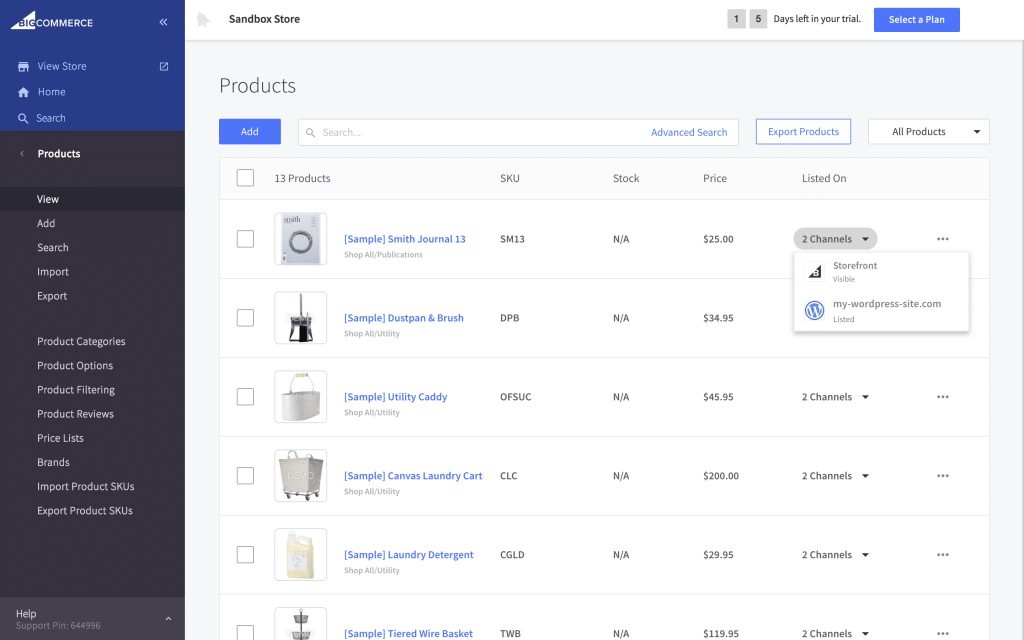
Building an ecommerce store on Adobe Commerce requires the technical expertise of the platform and profound knowledge in HTML, CSS, PHP, Java, and JavaScript programming languages. That’s the price to pay for high platform customizability.
At a first glance, the Magento Admin dashboard can also seem complex. But once you get to know all the terminology and areas of editing your storefront (e.g. SEO settings, product page view, order analytics), website management becomes pretty straightforward.
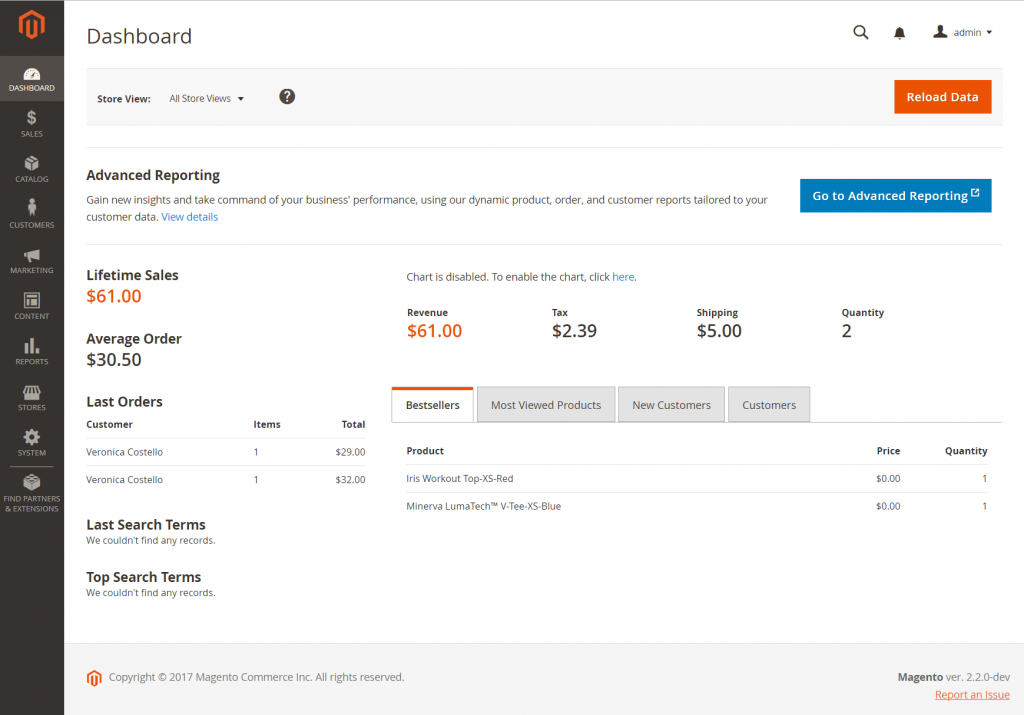
Which Is Better: BigCommerce or Magento?
There’s no winner when it comes to the fight between Magento 2 vs Bigcommerce. These are both powerful solutions targeting two different types of merchants. Your choice of the platform should be based on your business requirements, budget, expected growth, and tech background.
Choose BigCommerce if:
- You run on a tight budget and have no development team to take care of ecommerce infrastructure and administration.
- You look for an easy setup and a quick go-live solution.
- You sell via multiple channels, including social media, and want to take advantage of the marketing features.
Choose Adobe Commerce (Magento) if:
- You value customization and want to create a one-of-a-kind web design & functionality.
- You are not scared of experiments and have sufficient financial/technical resources to build up your project.
- You have thousands of products on your catalog and wish to go beyond multichannel commerce (into omnichannel or headless, for instance).
- You run a B2B store and wish to create a B2C-like shopping experience.
Which type of merchant looks like you? Leave your comments below!
Migrate BigCommerce to Magento (and Vice Versa): Elogic Expertise
We can’t leave you empty-handed, so we’ll finish the article with two offers.
If you already run a BigCommerce store but it doesn’t meet your growing ecommerce ambitions, migrate to Magento. Elogic has massive expertise in Magento 2 migration, helping 20+ online retailers across the US, Europe, and the Middle East upgrade to the latest version of the platform.
If, on the other hand, you’re not ready to undertake a large Adobe Commerce project, replatform to BigCommerce. Having operated 13+ years in the ecommerce development market, Elogic has learned all the ins and outs of the major platforms and can safely migrate your product, order, and customer info from Magento to BigCommerce.
What you’ll get partnering up with Elogic:
✔ Time- and cost-effective project implementation.
✔ Secure data migration with minimum downtime.
✔ End-to-end support and team availability any time of the day.
Step up your ecommerce game and migrate your store to a safer environment with Elogic
See Magento 2 migration servicesFAQs
What is a BigCommerce platform?
BigCommerce is a Software-as-a-Service (SaaS) platform that allows you to build, run, and maintain your business online. The solution targets primarily small to mid-sized retailers who are looking for a fast-to-launch, easy-to-use platform for an affordable monthly subscription fee.
Is it worth using BigCommerce for small business?
BigCommerce will be a perfect fit for small businesses. It doesn’t require coding skills, is cloud-hosted, and offers a vast selection of pre-built UI/UX themes ready to use as soon as a retailer decided to build an online store.
Is BigCommerce open-source?
BigCommerce is a proprietary platform, meaning that you won’t be able to access and modify the core code of the solution. While this may be a huge advantage for small-sized retailers, enterprises will find it difficult to customize their BigCommerce store in terms of design and functionality. Adobe Commerce (Magento), on the other hand, is open source.
What is the total cost of ownership (TCO) for Magento and BigCommerce?
Depending on your business requirements and ambitions, both Adobe Commerce and BigCommerce may reach the same TCO in the long run. Even though BigCommerce pricing plans are relatively low ($29.95 for its Standard plan), you might eventually spend thousands of BigCommerce add-ons, themes, and custom features.
The Adobe Commerce license fee starts at $24,000 per year but has a much richer feature set. You might need to hire Magento developers to build the store for you, but you won’t need to spend extra on custom features.
FAQs
What is a BigCommerce platform?
BigCommerce is a Software-as-a-Service (SaaS) platform that allows you to build, run, and maintain your business online. The solution targets primarily small to mid-sized retailers who are looking for a fast-to-launch, easy-to-use platform for an affordable monthly subscription fee.
Is it worth using BigCommerce for small business?
BigCommerce will be a perfect fit for small businesses. It doesn’t require coding skills, is cloud-hosted, and offers a vast selection of pre-built UI/UX themes ready to use as soon as a retailer decided to build an online store.
Is BigCommerce open-source?
BigCommerce is a proprietary platform, meaning that you won’t be able to access and modify the core code of the solution. While this may be a huge advantage for small-sized retailers, enterprises will find it difficult to customize their BigCommerce store in terms of design and functionality. Adobe Commerce (Magento), on the other hand, is open source.
What is the total cost of ownership (TCO) for Magento and BigCommerce?
Depending on your business requirements and ambitions, both Adobe Commerce and BigCommerce may reach the same TCO in the long run. Even though BigCommerce pricing plans are relatively low ($29.95 for its Standard plan), you might eventually spend thousands of BigCommerce add-ons, themes, and custom features.
The Adobe Commerce license fee starts at $24,000 per year but has a much richer feature set. You might need to hire Magento developers to build the store for you, but you won’t need to spend extra on custom features.

